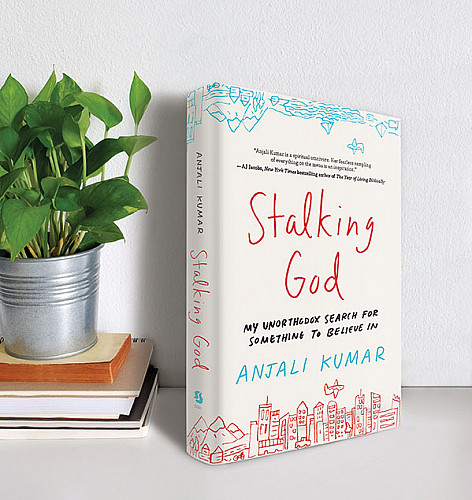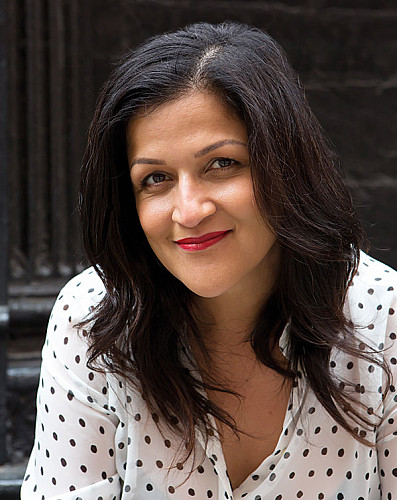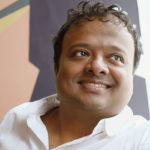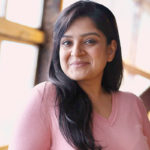In Search of Self
In 2010, Anjali Kumar, a New York-based lawyer at Google, had a spiritual crisis spurred by the birth of her daughter. She decided that she needed to set out to find god. However, Kumar didn’t settle for the familiarity of organised religion. Her multi-year search began with John of God, a medium based in Brazil who claims to channel kings, saints and doctors to heal people. This was followed by an eclectic spiritual sampling that tested her resolve. It required her to drink nausea-inducing volcanic water in Machu Picchu, have a Santa Claus-lookalike who is a tantric sound healer lie on top of her, attend pot luck on Thanksgiving with Wiccans and spend hours in a sweltering sweat lodge. All these spiritual episodes are wittily detailed in her eminently readable memoir Stalking God and referred to in her TED Talk which has been viewed over a million times.
As a self-avowed atheist, it was easy for me to dismiss Kumar’s insistence that “there has to be something out there.” Yet I was drawn to her winning candour and empathy which she uses to great effect in the book. Stalking God is more than a bible for believers; it’s a funny, illuminating and poignant look at our search for meaning and spiritual fulfilment in the modern world. An excerpt from a Skype conversation with Kumar….
Was it easy for you to jump into these strange spiritual rituals?
When Zia was born I remember having a conversation with my father about taking her to a temple. That kick-started it for me. “Oh my god, I don’t know what I believe in!” I thought. I had never really wondered about what religion meant. The beautiful thing about Eastern religions is that they are woven into the fabric of our everyday and so there’s an ease with which we deal with them. As for jumping into different things, that is a part of my personality. I like to dabble in things.
Why have you gravitated towards all these nontraditional belief systems?
I grew up with traditional religion. I’m a Jain married to a Hindu. I went to a Catholic school and I studied religious studies in college. So, I wanted to move away from traditional beliefs. Also, honestly, I didn’t want to rile up angry religious people.
You have also given SoulCycle (the fitness company) and Burning Man (an annual avant-garde community festival) a shot. Many would consider these corporate and capitalistic institutions. SoulCycle, I would agree with. I’m surprised you are saying that about Burning Man.
SoulCycle is a workout routine but the teacher’s sermon is almost spiritual. In New York, hordes of people come out in SoulCycle T-shirts really identifying themselves with this workout in a way that reminds me of religious garb. I thought that was interesting. Why are people convalescing around this philosophy? As for Burning Man, it’s meant to be quite utopic and egalitarian. People leave the trappings of the developed world behind and go into the middle of the desert and rely on the kindness of strangers for a week.
What experiences didn’t make it to the book?
There was a high-profile healer who was trying to tickle me to get me to laugh and release toxins. It was very strange and uncomfortable. Then there was a woman who did a spring ritual. She set up an altar with tapestries of block prints and served Cadbury chocolate eggs to us. I was unable to stop giggling. Then she said something I needed to hear. “There’s no right or wrong way to do this. The only thing I ask is that you respect the ritual.” It was a real slap in the face for me. So I had to go into this unbiased, and be respectful of others even if I didn’t agree with them.
Which are the new spiritual beliefs that you have tried to integrate into your daily life?
I’ve been meditating every day for 20 minutes in the morning for the past seven years. It wasn’t something that I did as a child. I also do some sort of modified prayer where I just say a couple of things in my mind, not to a specific god or goddess or person. I do not go to SoulCycle. I probably should! The biggest spiritual practice I have adopted though is to keep an open mind and heart.
Have you finally stopped searching nowadays? Are you spiritually secure?
I am. I have paused my frenetic search. After my TED Talk, I got many interesting offers but I have declined them. I’m good for now.
All of us are very different in our ideologies and world views. How could we bridge that gap?
I’m not trying to be reductive when I say we are all the same. If we can’t go beyond the political or spiritual or philosophical aisle, we’ll never get anywhere. We are trained by the powers that be to focus on the things that divide us and not on those that bind us together.
Recently, after I dismissed a friend’s belief in astrology, she said the reason so many women are drawn to it is because it exists outside of those structures of reason that are created by men. Even in your book, you seem to navigate spiritual practices outside the patriarchal structures of religion.
I totally agree. It wouldn’t surprise me at all, although, I didn’t look at my research through that lens. In my personal circle, I would say it is true that more women than men were amenable to such experiences while men were more amused by it.
Religion is a societal construct. It’s an interpretation of things that our (largely patriarchal) society couldn’t explain. Yet, at the core, all religions are relaying the same ideas through different cultural contexts. The spiritual beliefs that I explore in the book could be less hegemonic translations of the same messages.
How do you make a fair assessment of religious beliefs that don’t seem congruent with 21st-century values?
I was writing a memoir and I wanted to be objective. It was important to get the tone right and so I relied on my own bumbling journey for the humour. It was a very hard and quite a delicate balance to maintain. So I had to be respectful of others even if I didn’t agree with them.
But to address the question you’re asking it’s about how you keep an open mind. It really is a challenge in these times. I have tried to show people that being curious and putting ourselves in others’ shoes is the only thing that will broaden our world view and show the commonality of our humanity. If you want evidence of the world being a terrible place, there’s plenty of that but I was trying to do something different which doesn’t reinforce our silos. And I didn’t realise how topical it would be in these charged times when I was writing the book.
Related posts from Verve:
Verve Trending
Sorry. No data so far.
us on Facebook to stay updated with the latest trends







